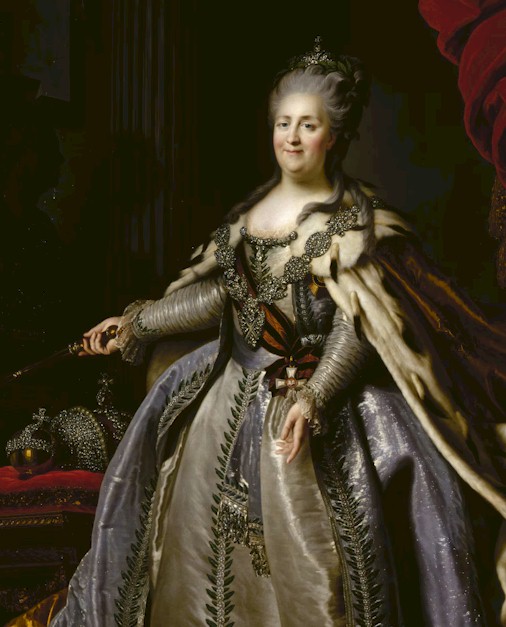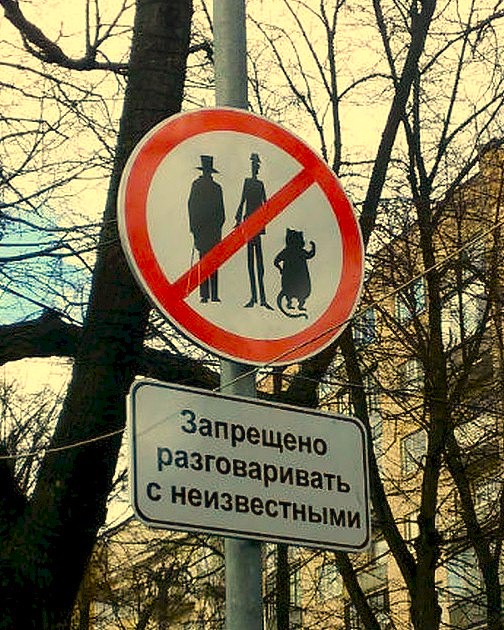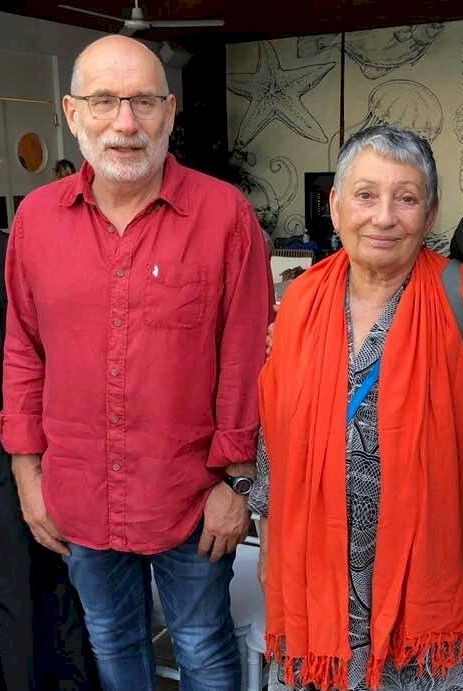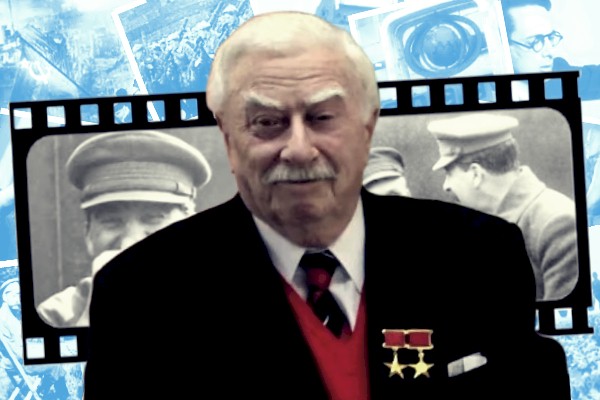Мы продолжаем напряженно работать, чтобы улучшить наш сайт и перевести его на другие языки. Русская версия этой страницы еще не совсем готова. Поэтому мы представляем здесь пока английскую версию. Мы благодарим вас за понимание.
Личность Путина
Путин и Сталин
Vladimir Vladimirovich Putin shares many character traits and behaviours with Iosif Vissarionovich Stalin, the man who held the Soviet Union in a tight grip at the time Mikhail Bulgakov wrote The Master and Margarita. Like Stalin, Putin exhibits a need for control, disdains the rights and freedoms of others, is willing to use any means necessary to achieve his goals and eliminate opponents, and concocts scenarios supported by massive propaganda - all of which is strikingly similar to how Stalin expanded and consolidated his power in the 1930s.

Иосиф Виссарионович Сталин
And like Stalin, Putin also likes to portray himself as a «strongman». He shows no remorse or regret when making unethical decisions, and is unconcerned about the negative consequences they might have for innocent people. He also refuses to take responsibility for the negative consequences of his decisions and typically blames others when things go wrong. This attitude is often accompanied by the well-known Calimero complex, in which a smaller person or party feels they are not taken seriously because of their size compared to a larger party.
Iosif Stalin, for example, wanted the ceremony of Germany's unconditional surrender to the Allies to be re-enacted on May 8, 1945, because the original document had been signed in the, in his view, too modest northern French city of Reims, and by the rather unprestigious General Ivan Alexeyevich Susloparov (1897-1974), a Russian liaison officer with few contacts in the Kremlin who happened to be staying in Reims.

Иван Алексеевич Суслопаров
Stalin demanded that the ceremony in Reims be considered a «dress rehearsal» and that everything be repeated in the more prestigious German capital of Berlin, with the more illustrious Marshal Georgy Konstantinovich Zhukov (1896-1974), Commander-in-Chief of the Red Army, representing the Soviet Union. That's why Victory Day is now celebrated in Russia on May 9th, and not on May 8th, as in most other countries. And that continues to resonate today: anyone searching online using Russian search engines like Yandex for photos of Susloparov signing the treaty will only see photos of Zhukov.

Георгий Константинович Жуков
Attitude towards Ukraine
«A common enemy unites us». That's an adage every autocrat knows and applies. And especially when a long-standing aversion to one specific group exists among their own population - often based on age-old prejudices and stereotypes - it's easy for an autocrat to present that group as a common enemy. Adolf Hitler targeted the Jews, Recep Tayyip Erdoğan targets the Kurds, Benjamin Netanyahu exterminates the Palestinians... And Putin learned from Stalin and the tsars that Ukrainians are best suited to serve as a common enemy for the Russians.
After all, the Russian rulers' sense of superiority toward Ukraine and its people is centuries old, regardless of the political ideology they invoke - from the tsars to the communists to the ultra-capitalist Putin. In 1783, for example, Crimea was annexed by the then Empress Yekaterina II Alexeyevna (1729-1796), better known as Catherine the Great. Later, after the Second Russo-Turkish War (1787-1792), she annexed the land in Ukraine between the Dnieper and Dniester rivers. In the following years, she pursued an active Russification policy. This meant banning the use and study of the Ukrainian language and pressuring people to convert to Russian Orthodoxy.

Екатери́на Вели́кая
In 1932-1933, Stalin deliberately decimated the Ukrainian population by creating the infamous Голодомор [Holodomor] or famine. He was determined to show off his achievement of the unreasonable targets of the 1928-1933 Five-Year Plan, which were largely to be realized through grain exports. In Ukraine, dubbed «the breadbasket of Europe», the 1932 harvest had failed due to bad weather and endemic plant rust, yet Stalin nevertheless increased mandatory grain deliveries to the central state and deported millions of kulaks (independent farmers) to Siberia. The death toll in Ukraine as a result of this policy is estimated at between 2.5 and 7.5 million. However, Stalin continued his propaganda campaign with the slogan «Our Homeland. Our Abundant Harvest».

On July 12, 2021, Vladimir Putin published his essay историческом единстве русских и украинцев. [Ob istoricheskom yedinstve russkich i ukraintsev] or On the Historical Unity of Russians and Ukrainians on the presidential website. It reads as a historical, political, and security rationale for an invasion of Ukraine, which gained independence in 1991, and can thus in that respect be compared to Hitler's Mein Kampf. It was, after all, a thinly veiled message that one could expect a war of extermination. The essay's central proposition is that Russians, Ukrainians, and Belarusians constitute one people and belong to the so-called Pan-Russian nation. In the essay, Putin denies that Ukraine can be considered an independent state. He sees the formation of a Ukrainian state as a threat against the Russians. In other words, Ukrainians are only brothers when they submit to Russian authority. We have added the English version of Putin's essay to our archives, along with a question-and-answer session published on the same website on July 13, 2021. Click the arrow below to download the essay and Q&A.
In 1994, Russia had presented itself as a guarantor of Ukraine's territorial integrity - along with the United States and the United Kingdom - in the so-called Budapest Memorandum, after Ukraine abandoned its Soviet-era nuclear weapons and acceded to the Non-Proliferation Treaty. However, according to Putin, the Russian promise of Ukrainian territorial integrity was no longer valid after the «unconstitutional coup» in 2014. He claimed that a new country had emerged after this power shift, just as it did in the Russian Empire after the 1917 revolution. According to Putin, Russia had made no agreements with this «new Ukraine».
In true Stalinist style, Putin has publicly suggested several times that «the Ukrainian people must be destroyed as a political factor and social entity». His seriousness is evident from the fact that in the large-scale war in Ukraine, most airstrikes are aimed at civilian targets such as apartment buildings, public utilities, hospitals, and schools, and that Putin does not hesitate to increasingly deploy prohibited weapons like cluster bombs and a wide range of chemical weapons - weapons that primarily affect civilians and are deliberately aimed at inflicting as many casualties as possible. The abduction of Ukrainian children and their subsequent «re-education according to Russian values and norms» to be «adopted» by families in Russia also fits into this framework. The most cynical element of this policy is the fact that its implementation is in the hands of Maria Alekseevna Lvova-Belova, the Russian Commissioner for Children's Rights, and Aleksey Aleksandrovich Petrov, her advisor who organises the «re-education» and has openly flaunted his Nazi sympathies on several occasions.

Мария Алексеевна Львова-Белова

Алексей Александрович Петров
Interventionists
Under Stalin, the term «class enemies» was often used as a recurring theme in communist propaganda. But just as often, opponents were described as «interventionists» or «agents of foreign, imperialist powers». In The Master and Margarita, Bulgakov denounced this practice from the very beginning with the title of the first chapter - Never Speak to Strangers.

Патриаршие пруды, Москва
Interventionism is the term used to describe actions taken by a nation or other geopolitical entity to influence and manipulate an economy or society.
This tactic was eagerly adopted by Vladimir Putin, who gradually created a legislative framework to label any opposition as a foreign intervention. It began with his law on «foreign agents» of July 20, 2012, which obligated non-governmental organisations and individuals receiving foreign financial support or «under foreign influence» to register with the Ministry of Justice as «foreign agents». They were required to mention this status in all media and online publications. Often, fanatical nationalists lend a hand in informing public opinion, as Oleg Petrovich Orlov, chairman of the Memorial Human Rights Center, regularly experiences.

Олег Орлов у заляпанного фасада
Правозащитного центра «Мемориал»
A 2020 amendment required organisations that were already «foreign agents» to report not only on the organisation's leadership but also on each employee. The July 2022 law also gave the Ministry of Justice the right to initiate the determination of an organisation's status as a «foreign agent». This can happen even if there is no evidence that someone receives foreign funding, or when, for example, Russian writers like Lyudmila Ulitskaya and Boris Akunin receive royalties for the translations of their work abroad. In this sense, Bulgakov, who never got permission to travel abroad, would also be called a «foreign agent» in Putin's Russia. Since his works were constantly banned in the Soviet Union, he often had to rely on his copyrights from abroad to survive.

«Иностранные агенты» Борис Акунин и Людмила Улицкая
The label «foreign agent» is highly stigmatizing. For many Russians, it means something like «foreign spy» or «traitor». Kremlin-aligned media outlets readily exploit this label. A «foreign agent» is severely restricted in society because government agencies and representatives are not allowed to cooperate with them. They are also not allowed to organize public events. They are subject to increased surveillance by the authorities. When giving an interview, they are required to introduce themselves as a «foreign agent». Media outlets are not permitted to publish anything about «foreign agents» without mentioning this label.
In addition, there is also a list of «undesirable organisations». These are prohibited from operating or organising within the Russian Federation. The term «territory» also includes the Russian-occupied areas in eastern Ukraine and Crimea.
Putin's Personality
What can we say about Putin's personality? While we cannot diagnose the motivations of political leaders without subjecting them to scientific personality tests, we can assess them through behavioural observations or through testimonies that are leaked - accidentally or otherwise. We can also look at their speeches, their decisions and the way they are made, or the interviews they grant. We can also compare them to the development of autocratic leaders throughout history. From this, we can learn that many of these leaders share serious character flaws that are consistently similar across borders and cultures. This is not necessarily a bad approach.
Biographical data or physical characteristics can also help complete the picture. Without resorting to stereotypes, we can nevertheless say that, for example, short men often exhibit extremely ambitious behaviour to compensate for feelings of inferiority about their short height, as a 2018 study by Vrije Universiteit Amsterdam demonstrated.
The Short Man Syndrome
The Short man syndrome is an informal term from psychology and is a form of inferiority complex. It is often - incorrectly - also called the Napoleon complex (see box below). In 2018, a study by evolutionary psychologist Mark van Vugt at the Vrije Universiteit Amsterdam found evidence for the syndrome in men. Shorter men behaved more aggressively when negotiating with taller men. The resulting theory assumes that short men must use clever tactics to compensate for their short stature.

Mark van Vugt
Short Men in Power When Iosif Stalin escaped from his Siberian exile in 1904, a telegram was sent to the Irkutsk Security Service with a description of the future leader of the Soviet people, including his height: he was 38 вершок [vershok], or 169 cm tall. When Boris Yeltsin, who was himself 189 cm tall, wanted to appoint his successor, he could choose between three tall men: Boris Nemtsov (187 cm), Nikolay Aksenenko (185 cm), and Sergey Stepashin (183 cm). But in the end, Yeltsin decided to choose the much shorter Vladimir Putin (170 cm). Incidentally, Putin himself could have chosen Sergey Ivanov (181 cm) [*] when he wanted to appoint an interim successor in 2008, but he chose someone who wasn't exactly head and shoulders taller than him: Dmitry Medvedev, 166 cm, was even shorter than him. [*] Under Stalin, not only words but also photos were «adapted» to suit the occasion. And that's happening again now. In the photo above, Putin (167 cm) and Medvedev (166 cm) appear to be about the same height as Ivanov (181 cm) - after some Photoshopping.
For the record: the French Emperor Napoleon Bonaparte (1769-1821) was also 170 cm tall, but that made him taller than the average Frenchman of his time. The myth that he was short was perpetuated by the English, who claimed he was only 157 cm tall. The claim was based on a calculation error in converting measurements from the British Imperial System to the metric system, but when the English discovered the error they deliberately kept it secret to perpetuate the myth. |
Authoritarian and Autocratic Leaders
Authoritarianism is a political system characterised by the rejection of political plurality, the use of a strong central authority to maintain the political status quo, and the restriction of citizen participation, the separation of powers, civil liberties, and the rule of law.
Authoritarian regimes can be autocratic (absolute power in the hands of one person) or oligarchic (power rests with a small number of people).
Despite the fact that Vladimir Putin is surrounded by a network of people, he can certainly be labeled autocratic. After all, his entourage, with the possible exception of Yuri Valentinovich Kovalchuk, consists of individuals concerned only with maintaining the president's favour by fulfilling his stated or perceived wishes as accurately as possible. You can read more about Putin's entourage by clicking the arrow below.
An authoritarian leader has little respect for rules and only applies existing rules when it suits him. Furthermore, it's not uncommon for an authoritarian leader to bend the rules to his advantage. When Putin, after his second term as president, was constitutionally barred from running for president for a third time, he nominated Dmitry Medvedev as his successor. Medvedev, in turn, appointed Putin prime minister, a position Putin held for four years. In 2012, he was thus able to run for president again, having meanwhile extended the legal term to six years. He won the presidential election and once again swapped roles with his political ally Medvedev. During his next term, he had the constitution amended again to simply remove the term limits for the presidency. In practice, this made him president for life.

Авторитаристы (мужчины ведут себя плохо)
Саймон Тисдалл (The Guardian)
But it's not limited to bending the rules to suit his own interests. An autocratic leader like Putin expects his decisions to be followed without question, even if the law prohibits it and considers it a crime. In other words, he is capable of committing crimes for which normal citizens would be convicted and punished. In this regard, Putin has an impressive track record. For example, he won his first election in March 2000 in the aftermath of a series of terrorist bombings on apartment buildings in Buynaksk, Moscow, and Volgodonsk, which left a total of 307 dead and over 1,700 injured. Thanks to some stupid mistakes by the perpetrators of the attacks and some rather clumsy communication from FSB chief Nikolay Patrushev, an old schoolmate of Putin's, the investigation was able to determine that the attacks had been carried out by the FSB itself. Putin blamed Chechen terrorists, expecting the population to vote for a «strongman», and it worked. Putin became president with 53% of the vote.
The elections for his third term in 2012, on the other hand, were marred by massive fraud. Just hours before polling stations closed, the independent observer group Golos had already received more than 2,000 reports of violations from across the country. Officials visited elderly people and people with disabilities at their homes and cast their ballots themselves while the voter watched. During the counting of ballots, in many places, more votes were counted than the number of registered voters. This was due to Putin's supporters being driven in vans to multiple polling stations to cast their ballots for him, and local poll workers depositing extra ballots in the boxes. This was documented in hundreds of video images across the country. There are even images of people being required to show their ballots before depositing them in the ballot box and, if they hadn't voted for Putin or his party, being confronted by local officials in front of everyone present: «Aren't you ashamed?», «Does your conscience permit this?», «Do you think this is normal?» Civil servants and teachers were given 200 ballots to take home to fill out in advance with the «correct» vote. Those who hesitated to do so were «motivated» with an «incentive» of up to 2,000 dollars.
It was difficult to choose an example from the hundreds of images taken that day. I opted for 20 seconds in the life of polling station No. 462 in the city of Astrakhan on March 4, 2012. It is typical because the 13 people present collectively and openly committed a violation of Article 142.1 of the Russian Criminal Code, «Falsehood of Voting Results.» The instructions were that Putin's victory had to be overwhelming, so votes for candidates Zyuganov and Prokhorov were transferred to the pile containing Putin's votes.
Antisocial Personality Disorder and Pathological Narcissism
A more comprehensive approach to Putin's personality can be derived from the findings of Dr. Frederick M. Burkle Jr. of the Woodrow Wilson International Center for Scholars in Washington, DC, USA. Burkle is a globally renowned and respected researcher on, among other things, the effect of autocratic leadership on humanity. On October 12, 2015, he published a groundbreaking article with Cambridge University Press on «Antisocial Personality Disorder and Pathological Narcissism in Protracted Conflicts and Wars of the 21st Century». It became the most-read article on Research Gate in 2016. On January 15, 2019, he expanded on this when he published his findings on «Character Disorders Among Autocratic World Leaders and the Impact on Health Security, Human Rights, and Humanitarian Care».

Фредерик М. Беркл-младший
He warned at the time that «political leaders with narcissistic and antisocial personality disorders are becoming a major source of humanity's problems».
Decades of research in organizational psychology show that autocratic and authoritarian leaders make all the important decisions themselves. They are highly task-oriented and less, if at all, interested in the general well-being of their people - although they often proclaim in their propaganda that their actions are undertaken for the good of the nation.
Another telling sign is that they maintain distance from others—among other things through punishment and threats. But also often simply physically. Hitler hid in his bunker, Stalin lived in the Kremlin in a closed-off paradise with four-meter-thick walls for the leaders' families. They lived there for large parts of the year with their children, as one big family, in spacious apartments, in all luxury and in stark contrast to the sad fate of the people. During his time in office, Putin has «disappeared» for weeks at a time without the outside world knowing his whereabouts. And when he meets others, he creates an exceptionally large physical distance. The photo showing how far Putin kept French President Emmanuel Macron at a distance has become iconic.

Путин с Макроном
The character traits shared by authoritarian leaders stem from a cognitive and emotional developmental delay in both childhood and adolescence, resulting in fixed, concrete thought patterns that persist throughout life. They fail to reach the final stage of mental and emotional development - the stage of abstract thought, necessary for critical reasoning - which allows people to consider the broader meaning of ideas and information rather than relying solely on concrete details and impulses.
An example of the latter is the fact that, when Volodomir Zelensky was elected president in Ukraine with 73 % of the vote, several far-right candidates obtained 2 % of the vote - far less than in many other European countries, and a minor detail in the bigger picture. But Putin framed this within his fixed, concrete thought patterns, began to attach more weight to it than what the facts indicated, and justified his invasion of Ukraine by persistently pointing to the alleged Nazi character of the Ukrainian state. He created the image of «neo-Nazis who had settled in Kyiv and held the entire Ukrainian people hostage» and decided it was his job to «denazify» the country. This idea appears in almost every speech he gives. He conveniently forgot that Ukrainian President Volodomir Zelenskyy himself is a Jew.
Incidentally, at the time of the large-scale invasion of Ukraine in February 2022, Putin himself was still the financier of the far-right Wagner Group, which did the dirty work for Russian interests in Crimea and Donbas in Ukraine, as well as in Syria, Libya, Sudan, Mali, and the Central African Republic.
Autocratic leaders have a limited capacity for empathy, love, guilt, or fear, which become permanent and guide daily decision-making. They are less compliant in terms of trust and altruism and less emotionally stable compared to less autocratic leaders. They also score higher on antisocial dark personality traits such as narcissism (delusions of grandeur, superiority, and arrogance), psychopathy (low empathy, aggression, and impulsiveness), and Machiavellianism (manipulation and deception).
Viewed from this perspective, many signs point to the conclusion that Putin has worrying antisocial tendencies. He makes no effort to hide this—it is sometimes even very visible in his behavior toward political rivals and international leaders. For example, when he first met German Chancellor Angela Merkel, he deliberately brought his black Labrador, Konni, to the photoshoot for the meeting, despite - or perhaps because - he knew she was afraid of dogs. In her memoirs, Merkel wrote: «I tried to ignore the dog, even though it circled beside and around me. I could tell from Putin's facial expressions that he was enjoying the situation».

Путин с Меркель (и собакой)
Doppelgangers
One of the common characteristics of autocratic leaders is their paranoia. While their massive electoral scores often give them the illusion of exceptional popularity, they may realise that those around them have fabricated these scores, and that groups or individuals may be pondering how to eliminate them from the political scene. There's a story about a photo of Joseph Stalin that people in the former Soviet Union used to share, depicting Stalin giving his son a lesson in despotism. «Do you think I'm Stalin?», he asks. «You're wrong! That's Stalin over there». And he pointed to a portrait of himself hanging on the wall - the same photo that hung in almost every household in the USSR. By this, he was referring not only to his public image, created and maintained by his propaganda, but also to the real, living individuals who were supposed to act in his stead when he might be a potential target for assassination, primarily in cars entering and exiting the Kremlin, at mass rallies, or to conceal the leader's health problems. In my younger years, the mere idea of doppelgangers of autocratic leaders was laughed off as a conspiracy theory - fodder for the tabloids. But since, in 2008, Putin gave Feliks Gadzhevich Dadaev (°1924) permission to make his remarkable story public, we know better. Dadaev revealed that he was one of four doppelgangers used by Iosif Stalin at the height of his power. Dadaev was born in 1923 in Dagestan, a republic bordering Georgia, where Stalin was born. During fighting in Grozny in 1942, he was seriously wounded, so seriously that he was taken to the hospital as a corpse and his family was told he had been killed. But when it later turned out he had survived, the authorities apparently realized this was a unique opportunity. After all, he bore a striking resemblance to Stalin, even though he was forty years younger, and from then on, he became a full-time doppelganger. But simply resembling Stalin wasn't enough. The young man had to spend months perfecting the leader's distinctive Georgian accent and intonation, as well as his body movements. The practice has been in the news again in recent years, with speculation that Vladimir Putin also employs doppelgangers to take his place in case of health problems. According to Kirill Oleksiyovych Budanov, head of the Intelligence Directorate of the Ministry of Defense of Ukraine, Putin has at least three doppelgangers. But Viktor Mikolajovich Yagun, a retired major general of the Ukrainian Security Service (SBU), is only one doppelganger. «You can only train one person who looks like you, not more». His name, however, is unknown, and we will only know him in about fifty years, when the archives are released. |







